#my struggles are valid. and if an entire university sees and finds my case worthy enough of me having a status that
Explore tagged Tumblr posts
Text
tumblr cut me off so i'm going to continue rambling on the tags here
venting real quick
#(tw alcohol)#where was i? OH RIGHT#basically I always have this mean voice saying I don't deserve the status and i'm taking pity on myself#and that I should just suck it up cause like everyone is doing it. why can't you you pathetic little worm?#which is silly cause like#my struggles are valid. and if an entire university sees and finds my case worthy enough of me having a status that#acknowledges my difficulties and may help me live an academic life that better suits my needs#than it must be valid right?#BUT NOOOOOOOOO lil brain demon keeps telling me i'm weak and dumb and stupid#ANYWAYS THAT WASN'T THE POINT I WAS TRYING TO GET AT ORIGINALLY#SO! ya girl is serioously considering getting just a liiiiiiiiiiiitle tipsy to feel something for a second#like I will do anything to snap out of this nothing#the nothing hurts#I just want to feel literally anything but this emptyness and thir hollowness#but YEAH it's probably not a good but a lil can't hurt right?#like just for an hour or two and then i'm gonna drink a metric shit ton of water take a shower and call it a night#doesn't seem so bad#plus i'll actually feel something beyond this silent ache#still pondering#will keep you guys posted
2 notes
·
View notes
Text
Morality Guide
All of my characters have “Classical Alignments” listed in their About Pages, but I decided I wanted to expand on that, since it only really gives you an idea of what you’re dealing with. So if you’re interested in hearing the in-depth analysis of why I put them where they are, keep reading! Going in order of when they were added. (This might continue to be updated as I add more characters.)

Xavier: Chaotic Good
Xavier is a young man who’s deeply disillusioned with the establishment and how the world works as a whole. He’s convinced that nothing will ever change and no good will ever come unless the entire system is burned to ashes. While he’s emphatic about protecting those weaker and underprivileged, he’s also quick to resort to violence to get the result he wants.
This ideology is pretty firmly baked into his persona due to years of trauma and abuse. It’s hard to get him to change his ways, but not impossible. Someone caring and patient enough might be able to ease his savage temper and make him see that maybe he DOESN’T have to default to violence all the time and that maybe some people in the establishment genuinely care for the well being of others and can stay. So he’d drift towards Neutral Good in that instance.
That said, someone could also convince him to become utterly jaded in the idea that there’s even a concept such as Good or Evil in the first place, and just convince him that the only thing that matters is burning the establishment. In that instance, he’d become much closer to Chaotic Neutral, but due to his naturally caring nature, this would be much harder to do. His inclinations towards good are much stronger than his inclinations towards lawlessness, despite what it might seem on the surface!

Adrian: Neutral Good / Chaotic Good / True Neutral / Chaotic Neutral
This guy is possibly the second most flexible when it comes to interpretations of his morality. (More on that in a second.) He almost always starts out as either Chaotic Good (most Thief-only verses) or Chaotic Neutral (most Spy/Assassin verses). Obviously his “hobby” automatically puts him on the wrong side of the law, and in general, he can be quite selfish. Life has taught him that nothing actually matters except for fond memories and varied experiences you can relive later. Even his “Code of Conduct” is less about easing the suffering of others and is mostly about keeping things interesting for himself.
That said, he’s not nearly as baked into those positions as Xavier is. While he’ll never cross over into being completely evil, it’s pretty easy to mellow the Chaos aspect out since his rather jaded outlook on the world comes from a place of heartbreak rather than malice. If someone feels like going the extra mile and helping him realize he shouldn’t be such a selfish dick (to everyone but those he’s attached to), you can even possibly get him into the Neutral Good category! Otherwise, he’s likely going True Neutral.

Tobias: True Neutral (HIGHLY variable)
This guy is the one who has the highest potential to change from verse to verse. He’s smack dab in the middle of the chart, not because he’s perfectly balanced in every way, but because he’s super impressionable and will change based on the last thing that sounded good to him. How he ends up depends entirely on the people he looks to for guidance, for better or for worse.
I really can’t stress this enough. So far in most of his interactions, he’s been pretty good, if not a bit annoying and dude-bro-y. With good role models like Rose and Leon, he acts pretty respectably! With girls he wants to impress like Annalise, he can (eventually) be convinced to actually improve himself to be more appealing to them. He can become neutral good, or even lawful good with enough effort. It’s possible!
BUT. The flip-side is also possible. To put it bluntly, he’s one step removed from a full-blown incel, and I mean that in a completely literal fashion. This guy is one or two seedy internet forums away from losing his mind and trying to drive a truck into a crowd of women. It is THAT BAD. His sense of entitlement and desperation for anyone that will validate him makes him a prime target for radicalization, or even being directly used by evil people who will make him feel wanted.
In short, he’s the best Grunt anyone could hope to have. If you pay him with a sense of belonging, he will do ANYTHING you ask and subscribe to ANY ideology, no matter how fucked up.

Kouki: Lawful Good
Kouki’s as stereotypically Lawful Good as you can get. He is purely a pacifist, doesn’t eat meat (or consume animal products in modern verses like dairy), and probably would answer you literally stabbing him in the gut by threatening to raise his voice.
Like basically all of the guys listed above, his point of view came from a long life of abuse and neglect, but instead of getting jaded or angry with the world, he decided to make the conscience choice to live his life in a way that will never hurt anyone the way he was hurt in the past. He’s tied that philosophy with the “religion” he now lives his life by, and it won’t be changing any time soon.
There’s no way anyone could ever get him out of the “Good” category. The most you can hope for is convincing him that some laws are designed to hurt people and are thus unjust, resulting in a more neutral take. But even that’s going to be a struggle for you. This is a guy that lives and dies by his extremely strong moral compass.

“Doc”: Neutral Evil
This guy has no morals and is utterly self serving to the point of it being cancerous. I have him classified as Neutral Evil, because he does see the use in using the law to his advantage as a shield, when it suits him. But obviously the things he does isn’t ever going to be state sanctioned.
If given a choice, though, he’d be mostly aligned with the Lawful side than Chaotic. This guy absolutely LOVES twisting contracts and agreements to serve his needs. He finds the comfort that comes with having whatever you say backed up in ink very reassuring. That way if he ever does come down, at least he can drag his associates down with him.

Kyoko: True Neutral
While Kyoko’s morality is also variant based on the universe she’s in, it’s much less so than our friend Tobias. For the most part, she only sticks to the variations of Neutral and never strays too far to the extreme corners of LG/LE/CG/CE.
She is ultimately a self serving individual like Doc and Adrian, but unlike those two that are determined to twist the world to wring every drop out of enjoyment out of it before they drop dead, Kyoko’s mostly just trying to survive. She just exists in this space and is trying to get by as best as she can without raising a fuss or raising suspicions.
If that means a few people who saw too much maybe have to disappear, that’s too bad, but it’s the circle of life in a way. One being dies so another will live. And live, and live, and live, and live.

Kaneda: Chaotic Neutral
Kaneda’s kind of a surprising one for a lot of reasons, but I think how unstable his mood is in general makes a great case for Chaotic Neutral as opposed to True Neutral. Chaos is a large part of his life, as is the opposition to norms that he feels hold people back from their true potential. He always encourages people to be most true to themselves above all else, damn society.
He’s also commonly at odds with the law in many of his verses, but that has less to do with it -- unlike someone like Xavier, who’s made total anarchy his life’s mission. Kaneda’s opposition is mostly to societal norms and stuff like the gender binary and how one is allowed to express themselves.
That being said, Kaneda is pretty impressionable and is willing to do basically anything to prove himself worthy of being loved. Depending on who is influencing him, he can quite easily drift from Chaotic Good to even Chaotic Evil. (But Chaotic Evil is a bit of a heavier lift thanks to his general love of humanity.)

Touma: True Neutral
Touma is to True Neutral what Kouki is to Lawful Good. In fact, he might be even more rigid in his placement overall. He is the total opposite to Tobias, who will flip into another category at the drop of a hat.
Touma is almost militant in his desire and inclination to only look out for his own. He would do anything for his daughter and extended family as a whole -- no matter how cruel or sadistic. If it helps him in his goal to provide for his family, he’ll do it with no questions asked and no quibbles. And trust me when I say he’s done some fucked up shit in the past to achieve this end.
That being said, he doesn’t seek out such stuff, and would prefer to not have to do it at all. He has a working moral compass and knows what’s right and what’s wrong. It just ultimately doesn’t matter to him when the chips are on the table.
#headcanons: xavier#headcanons: tobias#headcanons: adrian#headcanons: kouki#headcanons: doc#headcanons: kaneda#headcanons: touma#ooc: deep dives#headcanons: kyoko
5 notes
·
View notes
Text
It’s been three years, and I fucking love Solas. Someone help me.
Are you ready for some unabashed Solas love? I sure am.
So three years today I was coming to the end of my first playthrough of Dragon Age: Inquisition. I’d already made a blog for my Inquisitor Cadash (before the game came out, to open up after I beat it), and that was all I was expecting to make.
Then, some bald elf grabbed her hand and helped her close her first Breach. I’d kept up with Inquisition news, and Solas seemed cool, interesting enough. I wasn’t really expecting or prepared for how much I’d come to love him. By Temple of Mythal I’d made a Solas blog, and when I finished on the 22nd I made the finishing touches, and here we are!
I wanted to spend some time talking about what I love about Solas, since there’s a lot of negativity about the character. Rping him I know that kind of negativity (not even criticism, which he very much deserves, just negativity that often completely ignores vast swathes of characterisation) can get very tiring to read and humour. Yes, I know he’s trash, let me tell you why I love him, both in spite of and because of those qualities.
Without further ado, welcome. Welcome to my disorganised rambling essay/list of why I have been writing this loser for three years now:
What first drew me to Solas was his experiences as a Dreamer. I majored in history as an undergrad, one of my favourite things as a historian was reading and reviewing primary sources. You find the truth in them, but only one person’s version of the truth. When Solas spoke of dreaming, he spoke to that knowledge: that history is never one story, and that at Ostagar Loghain could be hero and a villain at the same time. Both were valid readings, and both were memories that deserved to be remembered. Having a character who spoke to the history nerd in me was very special, I won’t lie.
As the game continued, Solas totally revolutionized Dragon Age lore for me? Even before it started to become obvious that he was more than just an elf who liked napping. Before Solas and Cole the Fade wasn’t a particularly interesting part of the world for me, but how Solas explained the personhood of spirits really affirmed what Dragon Age 2 had started to explore with the nature of Justice/Vengeance and Merrill’s banter.
It was some really beautiful world-building, to slowly pull back the veil (ha) and reveal that our perception of spirits in early games was really misguided.
And once it became obvious he was something more than what he wanted us to think (I had guessed he was related to Fen’Harel- although I had assumed it was something along the lines of Felassan since I had finished TME just before DA:I) it got even better? In DA:O elf lore didn’t really grab me like the dwarves or qunari, or even the mages. DA2 improved with Merrill, and then in DA:I Solas took what Merrill had granted us and ran with it. The lore he introduced was what made me elf trash, honestly. Before I was just kind of like... elf recycling? I loved Merrill, but wasn’t all that interested in Dragon Age elf lore as a concept. Now I am 100% trash and I will rot in this elf garbage dump until the universe ends.
His and Sera’s perspective on the Dalish really jerked me out of the perception of Dalish elves being Perfectly Fallen Elves, which had never been true, but their flaws are much more muted in DA:O and it took several playthroughs before I could really begin to wrap my head around how their behaviour towards Merrill only made matters worse. By listening to Solas and also Sera’s perception of them, it made going back and replaying early games more exciting, as I could see the seeds of issues DA:I would eventually explore. It’s why I enjoy DA:I so much because, imo, it compliments the lore of DA:O and DA2 so well for the most part.
And the lore he eventually brings to Elvhenan? Fantastic. Like I said, I had read TME beforehand, so I was already aware Elvhenan had issues, but revelation that the Elvhen gods were never gods, that their empire was not the perfect thing we had been led to believe? As much as DA:I played up the high fantasy angle more than DA:O and DA2, that revelation was very much a dark fantasy trope, and it fit perfectly with the overall tone in the series whereas before Elvhenan had seemed a little out of place. Empires are shitty by nature, and it was good to see the elven empire was no exception.
All these revelations are, to some extent, introduced or expanded upon by Solas. So I connect a lot of my love for the lore to him, and as a result I’m fond of him for that reason. I’m going to move on, though, because I’m like 800 words in and I haven’t touched upon him as a person lmao.
This one article that I won’t really touch upon for too long, namely because I couldn’t read it all, compared Solas to a fedora-wearer, which is a characterisation that drives me batty. Because Solas is a SJW, for better or worse. He can very easily identify problems in society, and people, and has no problem talking about them, even when it’s inappropriate.
He cares, he cares deeply. He cares even when it’s against his best interests to care.
If you take him with you through the Hinterlands (and beyond) you’ll find he approves when you help people, even people he might disagree with. Should you deliver a flower to Senna’s grave, and invoke Falon’Din’s name when you inform her widower, he approves. He approves even if he knows the Elvhen gods are false, and knows Falon’Din would not spend a second thinking about this poor man’s dead wife.
He cares when you choose to sacrifice the Chargers, and reinforce to Iron Bull that his worth lies only in the Qun. And if you choose to save them, he cares to reassure Bull that he is not a beast, but a person, and an intelligent one.
And whatever your relationship with him is, by Trespasser he decides he cares enough to save you. Even if he thinks your Inquisitor is so terrible he comes close to comparing them to the evanuris (especially Inquisitors he’s unfriendly to who claim to be chosen) he still decides that the south deserves better than what the qunari will give him. Trespasser was not a smart move for Solas, all things considered. He could have pulled out of the south, or left the Inquisitor to die without explanation. But he explains, because he cares enough to know he owes them that much.
None of this excuses what he plans, but how much he cares in spite of what he feels he must do is compelling.
I think one of the most telling things is the stories Solas can recount for you. When you ask him for stories, he tells you tales of Ostagar, or mighty battles, but the little moments he recounts for you are some of my favourite examples of what Solas finds important in the world. Dwarves seeing daylight for the first time, a qunari baker rebelling in a subtle way only she will know. This guy walks the Fade, and could in theory see every moment in history that people might kill to see, but instead comes across a memory of a woman baking and thinks “this is important.”
Stuff like that is, to me, demonstrative about how much Solas is about the people. He has a lot of growing to do when it comes to his perception of... well, everyone, but despite all of this he still does see wonder in really tiny moments. These are things you don’t often see, especially in jaded immortals, and it’s one of my favourite things about getting to know him.
Speaking of Solas’s perception of the modern world, let’s talk about it. It’s flawed as all heck (especially at the beginning of the game), but it makes total sense.
Waking up in a world where there’s essentially one less dimension, or perhaps half a dimension where there used to be a whole one? That’s not the sort of thing you just get over. Of the ancient elves we have met, all of them have expressed similar struggles. Abelas doesn’t recognise a Lavellan as Dalish, and Felassan only begins to see them as people towards the end of Masked Empire.
That Solas’s perception (that any of these characters) is able to evolve is impressive, imo.
I’m not saying he deserves to be praised for coming to recognise people as people, in case you’re wondering. What I love here is that Solas, that every ancient elf thus far, is allowed a very real reaction to an impossible situation. And what I love is, for as much as the fandom likes to paint him as stubborn, he is more capable of evolving than people give him credit for.
Of all the things to admit you were wrong about, admitting you were wrong about the entire population of Thedas is a pretty big thing to admit. It’s why I do have hope that Bioware will grant him at least a bittersweet happy ending. It’s clear, especially if you befriend him, he does not enjoy what he feels must be done.
And you may ask “then why do it?” to which I usually reply: the name of ‘traitor’ would suddenly be worthy of him, at least in his eyes, if he just turned his back on those he has worked for literal centuries to uplift. So many people try to convince Solas he’s wrong by... telling him what he’s doing is bad, which. It is, but he knows. Put that energy towards showing him how his rebels can live the life they were supposed to get after the evanuris had been toppled, and then, I think, people would start to make some headway in redeeming him.
Often when protagonists are redeemed it is with an appeal to the heart, and not the head. You appeal to their better nature. With Solas I believe redemption lies not in appealing to his better nature, because in a way he’s already using it. Instead, redemption for Solas will come from showing him that his heart is right, but it is his head that is the problem. Hopefully that makes sense? Show him that his people matter, and can be given their freedom, and then a happy ending may come after.
I could go on and on and on about everything I love about him, but I’m realising this is getting long, so maybe dedicating a mini-essay to every character trait was a mistake. I’m going to throw out a couple more, and try to wrap things up!
I love how angry he gets in banter. I’m someone who gets mad when I argue with people about social issues, especially when I otherwise had/have respect for that person, so hearing Solas get legitimately frustrated when arguing with Iron Bull is very relatable for me. I love that he’s allowed to be angry, and allowed to be right, even while being wrong about so much else.
I love his sense of humour, and his laugh. I love that as much as “Chuckles” is considered to be (even by the game) an ironic nickname, one of the first potential lines from him is him snort-chuckling about Varric being involved with the Chantry (at the first time we hear the nickname Chuckles, I believe).
I love that he loves spirits. I love that no matter what path you choose for Cole, he loves and supports Cole. I love that he understands spirit Cole is as much as a person as human Cole, and both are good and worthy of loving, even if Cole is going down a path he cannot fully relate to himself.
I love his lapses-- be it where he comes out looking something of a fool (setting his pants on fire) or just being a nerd in love on his romance path. He’s smooth, but he stumbles.
There’s so much more I could go into, honestly? His fashion sense, his relationships with each individual member of the Inquisition, the tenderness he is capable of, but I’m pretty sure this is getting too long to be worth reading. I may do a part two sometime (maybe next anniversary??) but for now, I hope everyone who somehow managed to read all of this has a better understanding of why I care so much for Solas, and why I’ve been writing him for four years.
I have no idea how many thousands of words I’ve written for Solas over the past 8,133 posts, but I do know this: I love how there’s still things I haven’t been able to explore in my prose, and I love that you guys will be here to explore them with me!
Thank you everyone who has stuck with my Solas for so long? Even after my mental health issues forced me to take a very long hiatus, I was surprised and touched by how many stuck with me. You’re all wonderful, and I hope you have a nice night!
If you could please refrain from any Solas negativity in comments or tags, I’d appreciate it!
#( ooc )#[ -don't reblog- without permission ! ]#( about me )#he calls himself Pride ( about )#( solas meta )#[ kind of lmao#i took painkillers before i wrote this and they hit half-way through so if it gets more incoherent i am v sorry ]
63 notes
·
View notes
Text
How to Take Amazing Photos to Promote Your Local Business

How to Take Amazing Photos
Customers are judgmental, help them with some amazing photos.
In fact, we're all judgmental, it's scientifically proven. Contrary to popular belief, being judgmental is necessary. When customers look at your business they make a judgment call, automatically.
Yes, No or maybe.
It's an unpopular thing to admit that we sort people, businesses and things based on their appearance.
But it's true.
Job applicants who look the part often do better in interviews. Well-dressed people who drive nice cars are viewed as wealthy. Attractive, well-presented businesses are viewed as more successful.
This caused scientists to ask a question.
Are customers judgmental?
Absolutely.
Alex Todorov and Janine Willis, Princeton University psychologists, discovered in their research that people respond to faces instantly.
Customers form first impressions in as little as 50 to 100 milliseconds.
Customers are making judgments about you and your business before they've had a chance to think about it. This first impression is visual and based almost entirely on emotion.
That's a big problem.
We're taught to believe a lie
The lie goes like this:
"It doesn't matter what you look like on the outside, it's what's on the inside that counts."
Remember that?
When it comes to marketing this is an absolutely dangerous lie. Customers should make judgments about the organizations they do business with.
The wrong choice can be devastating.
They can lose money, time and resources. They can be hurt, humiliated or punished for making the wrong choice.
Amazing photos guide a customer's choice
Amazing photos, regardless of your industry, are important. They give customers the information they need to properly evaluate your business.
It shows customers what to expect.
Most of the time, this evaluation process operates at a subconscious level. Customers use the information they've accumulated to make instant, gut reactions. Their assessment is fuzzy, quick and imprecise.
What exactly are customers evaluating in your photos?
1. Ingroup/outgroup. Simply put, customers ask themselves the question, "Are you like me?" If the answer is yes, the conversation continues.
2. Social class. Sadly, classism is viewed by many as the last acceptable prejudice in the world today. Customers use this to vet/validate the social standing of those they associate with.
3. Ethos and values. Every group has its own culture, its own set of values and norms. Customers expect your Ethos and values to align with theirs and the ethos and values of the group to earn their business.
4. Trustworthiness. "Will you hurt me?" Customers want to know they're safe with you. They're looking to decrease risk, pain and suffering.
5. Social status. Businesses with high social status and high social capital command a considerable amount of respect and prestige. As people, we're drawn to those around us who are exceptional in some way.
Local businesses tend to neglect photos, or they'll simply post unflattering photos that position their business negatively.
Not good.
But customers are absolutely looking for more photos. How do we know that?
They tell us. And Google tells us – just look at your Google My Business Insights.
Poor imagery kills the sale
A recent study from the National Retail Federation in the USA found that 94 percent of customers felt image quality was “very” to “somewhat important” in their buying decision.
Isolate women's responses and that number climbs to 96 percent.
Look at Yelp's top restaurants of 2017 and something interesting stands out. Each of these restaurants have hundreds and thousands of positive reviews and images.
Customers want to see…
★ High quality photos
★ Demand (e.g. lots of customers if you're a service business)
★ Alternate views (e.g. different views of product/business)
★ Topic specific images (e.g. cakes, tables, interiors, etc.)
★ Color changes, where appropriate
★ True to life imagery (e.g. view on model, customer photo of food, etc.)
★ View(s) in a room
The keywords here are quality and variety.
Customers want to see your business from more than one perspective. More photos give them the ability to evaluate consistency.
You'll never be able to take the perfect photo…
If you focus your time and attention on all these specific variables. It's overwhelming and simply too much for the average business.
You still need amazing photos though.
So, what do you do?
You focus on your ideal customers, the customers you'd fight tooth and nail to keep. Then use photography to present your business in a way that wows them.
How do you do that?
You focus on their wants and needs. If you're a fine dining restaurant looking for big spending regulars you show…
★ A pristine environment
★ Influencers who frequent your restaurant
★ A high class image (e.g. dinnerware, table cloth, attire, etc.)
★ Exclusivity markers (e.g. wait list, limited seating/hours)
If you know your customers, you know this is what they expect.
What if you're the owner of a Blues and Jazz cafe, like Blues City Deli and you're looking to attract more customers? With apologies for an example from the USA but the concepts translate well to the UK.
Step #1: Know your audience
You confirm the demographics and psychographics of the customer segments who are (a.) willing to pay and (b.) able to pay.
Then you figure out what makes them tick.
Their desires, goals, fears and frustrations. Their expectations from a Blues Cafe, their reading habits, how they spend their free time etc.
I wanted to know so I referred to a study by the Jazz Audiences Initiative (JAI).
They broke listeners down into six groups:
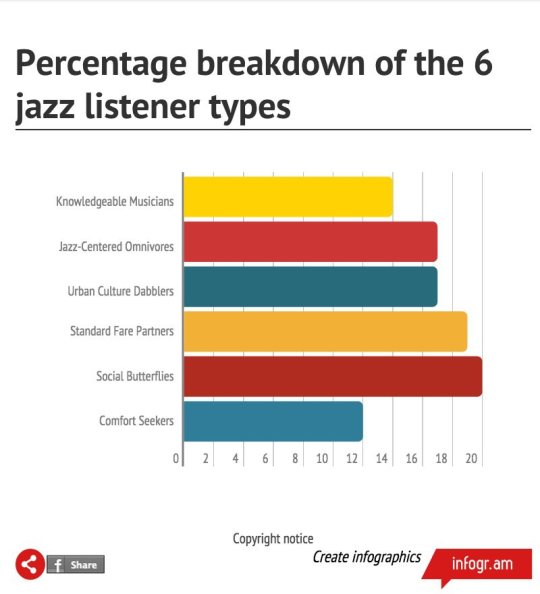
Research for Amazing Photos
They sorted them by education level:
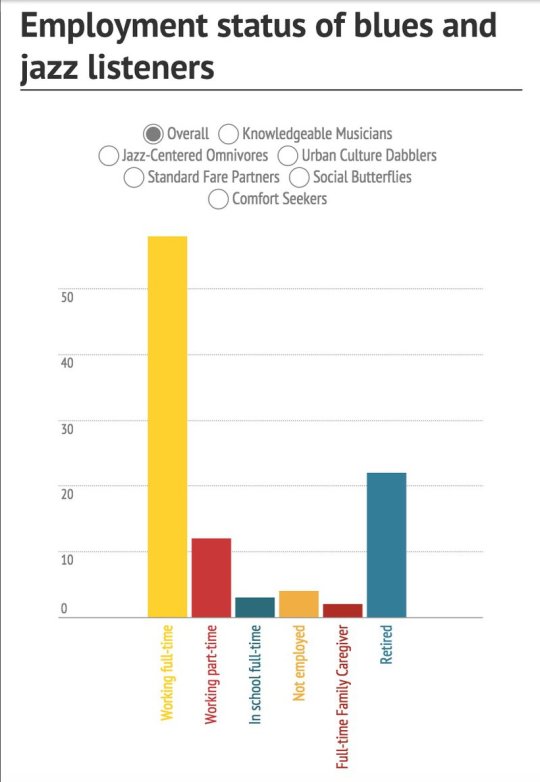
Research for Amazing Photos
By education status:
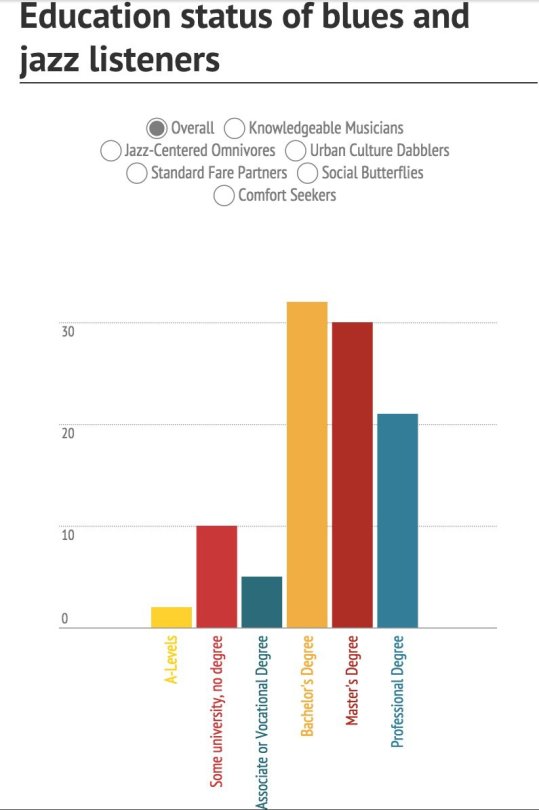
Research for Amazing Photos
And marital status:
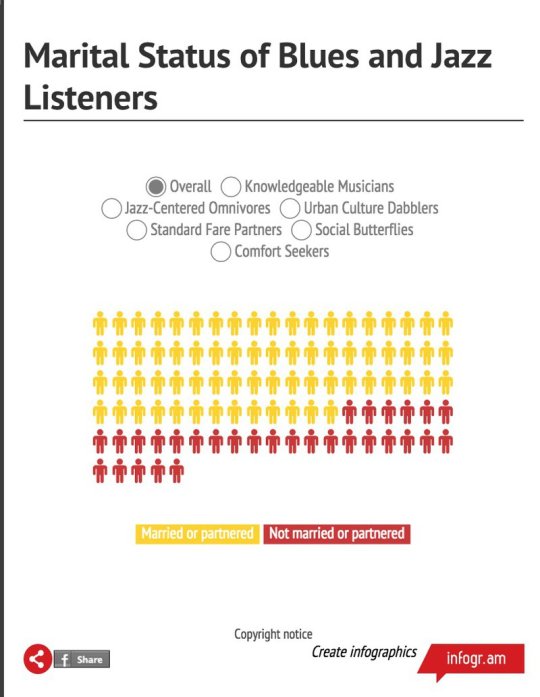
Research for Amazing Photos
So, with less than an hour's worth of research we know our ideal customer is:
★ A member of at least one out of six groups
★ Highly educated bachelors or above
★ Works full-time (which means discretionary income) or retired
★ Married or partnered
Armed with this research you're ready to…
Step #2: Reject the wrong people
Customers judge, remember?
Your photos don't have to be Smithsonian worthy but they should convey quality. Product, ambience oriented photos aren't about showing off your photography skills, it's about sending a message.
Customers are subconsciously looking for specific cues on:
★ Ingroup/outgroup
★ Social class
★ Ethos and values
★ Trustworthiness
★ Social status
Which is exactly what Blues City Deli does.
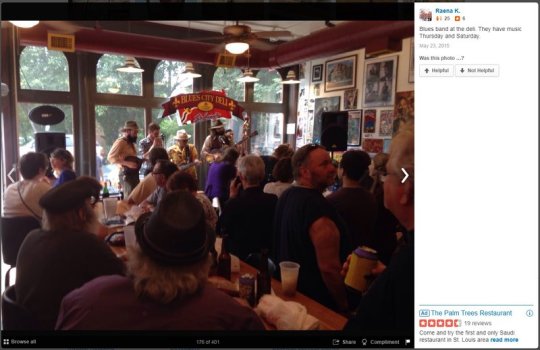
Research for Amazing Photos
See what they did there?
The right message is easy to convey if you attract the right audience.
Do the upfront work to attract the right audience and these details mostly take care of themselves. That's the problem though. Most local businesses don't do the upfront work.
So they struggle.
They attract the wrong people who, in turn, repel the right people.
Step #3: Take amazing photos
Remember, you're not looking to win a photojournalism award. You're looking to send a message.
Which is exactly what Blues City Deli does.
They share photos about their history.

Research for Amazing Photos
They convey status, showing they're so good customers are willing to wait.

Research for Amazing Photos
They sell the ambience.

Research for Amazing Photos
By inviting you to listen to Live Blues with them, they're telling you they're part of your ingroup. They're one of you.

Research for Amazing Photos
Something interesting is happening in their photos, can you see it?
No?
Did you notice the similarities between their customers? The style of dress, the attitude, demeanour and presentation?
That's homogeneity.
Take photos of your business; post, share and promote them on your local listings and profiles.
Step #4: Get customers to willingly promote you
How?
How on earth do you get customers to willingly promote your business, product or service?
It's simple.
You make your customers the hero of the story. You share your prestige with them. It's different for every business but there are all kinds of ways this can be done.
You could…
★ Get customers to join in on Live Blues night
★ Run a contest, then promote the winner
★ Brag about specific customers in a case study or testimonial video
★ Ask customers for advice, follow it, then show them that you did
★ Remember (and act on) specific things about your customers (e.g. birthdays, the anniversary of their first visit, bad day or tragic events, etc.)
★ Surprising/random acts of kindness and generosity (done as a habit).
See the secret? It's honour.
When you honour customers you're showing that you cherish them. That the relationship is more important than just "money".
Find a way to honour customers in a way that's meaningful to them and they'll find a way to share it with everyone. It's wonderful because you've given them a way to brag without bragging.
Sure sounds good, but it will backfire
Asking customers to share photos is a terrible idea. What if you train customers to "take pictures" and you make a mistake? You've given them everything they need to hang you.
That is true if you have a bad relationship with your customers.
Mistreat your customers and they'll eagerly wait for the chance to take you down. They'll tell their whole world, anyone, who'll listen about your failure.
If customers are neutral that's far less likely to happen.
Most customers don't write reviews. They read them sure, and most base their buying decisions on them. That much is true.
But the vast majority aren't willing to share their bad experience.
If you have thousands of reviews like the local businesses we've covered they're even less likely to share (though they should). They're less likely to spill the beans on your mistake if you have a good relationship or rapport with them.
Does that mean you should count on that?
No.
But you're far less vulnerable than you've been led to believe. If you're running a wonderful business you can counteract that.
Customers are judgmental, they should be
We're all judgmental, it's a necessary, scientifically proven part of life.
Customers are making judgments about you and your business before they've had a chance to think about it. This first impression is visual and based almost entirely on emotion.
Give customers what they're looking for, meet their wants and needs, and you'll find their judgment swings in your favour.
if(window.strchfSettings === undefined) window.strchfSettings = {}; window.strchfSettings.stats = {url: "https://mylocal.storychief.io/how-to-take-amazing-photos?id=340874733&type=2",title: "How to Take Amazing Photos to Promote Your Local Business",id: "2fa00077-23a5-4f07-b556-c811dc12f64f"}; (function(d, s, id) { var js, sjs = d.getElementsByTagName(s)[0]; if (d.getElementById(id)) {window.strchf.update(); return;} js = d.createElement(s); js.id = id; js.src = "https://d37oebn0w9ir6a.cloudfront.net/scripts/v0/strchf.js"; js.async = true; sjs.parentNode.insertBefore(js, sjs); }(document, 'script', 'storychief-jssdk'))
https://mylocal.org.uk/online-credibility/reputation-management/how-to-take-amazing-photos/
0 notes
Text
Unable to Connect
When I was in my twenties, I frequently remember letting out a big sigh and wishing I were psychic. I always thought that was odd. I mean, why not wish I were rich, famous or successful?
I guess I have always known that I had the capabilities of becoming - not just in my intuitive abilities, but also in all areas of my life. Deep down I must have known that success was always a given if I only let go of all the things I had been “taught” from others. I knew that joy and self-love was my true nature if I could only release the self-punishing thoughts and actions I learned as ways to cope with life’s disappointments.
Imagine being so dissatisfied with yourself that you learned to subconsciously self-punish from a very young age, and that you lived that way your entire life into your 40’s…
Imagine being shown and told and validated, over and over that you’re not worthy of being loved, valued, listened to, and protected. And then imagine you believe it to such a degree that you consistently treat yourself this way as well.
And it feels safe.
Imagine the amount of self-loathing that would take, and then imagine all the experiences one must go through in order for that to become their “safe normal”.
It wasn’t until I was 44 years old, after two painfully failed romantic relationships and career & human connection discontent, that I finally realized the one common denominator in all the areas of my life that caused dissatisfaction: me.
I often look back on that time, and can’t imagine being in that amount of pain ever again. That emotional frame of mind seems a little bit foreign and I’m so grateful this is the case. Because even though it was self-created, it was born from my experiences with Childhood Emotional Neglect (CEN). There is a name for it. That alone made me feel like much less of a shit-show as a human being, and more like someone who just needed some fucking help.
See, children empathically connect to their parents in order to feel protected and comforted when scared or upset. They also seek validation and support when feeling happy and excited and proud of themselves. How the parents respond has a HUGE impact on the child’s developing personality – the way they perceive fearful situations, the way they think, the way they behave, most importantly – how they feel about their world and THEMSELVES.
Our feelings and emotions are at the deepest core of who we are. They create our beliefs. When feelings and emotions aren’t acknowledged or validated, we begin to believe that we aren’t important because we aren’t worthy of being “seen”, listened to, valued and encouraged. The message is that our feelings don’t matter, are an inconvenience, or wrong.
What this taught me personally was to learn not to value my feelings and to push them away or numb them with food.
My emotional needs were rarely met, and my feelings never acknowledged – not by my family, my friends, my co-workers or any other source of human connection. As a result, I disconnected from myself and tried to prove my worth through behaviors that never truly fixed the issue, and always left me feeling never-ever good enough.
Certainly not good enough for positive attention or love.
As a result, it’s been a constant struggle my entire life to deeply connect with and understand the feelings of others. This I learned from a parent who was unable to connect with me and try to understand my feelings. No compassion, no comfort and no positive validation. Just irritation, inconvenience and indifference. “Go away, I'm not interested in listening to you. Go away, you don’t matter.”
Imagine that the one person you seek unconditional love and comfort from, was constantly telling you in any number of ways and behaviors, that you aren’t important enough to connect to and understand. To go away because you don’t fucking matter.
So based on JUST THAT realization, I have unconditionally, completely and totally forgiven myself for any and every fucking thing I have ever said or done to hurt another person.
Let me repeat.
I totally and completely forgive myself for EVERY FUCKING THING I have ever done or said that caused hurt and pain in another.
And with humility and deep regret, I ask you to forgive me. You may not have the capacity to forgive me – now or ever - and that’s your right. I can live with that knowledge as I practice radical acceptance of the way things are because of my part in them. I take full responsibility and I can handle all the emotions that come with it. I can have compassion for myself and learn from the situation so it rarely or never goes down that way again. The point is – I CAN.
But here’s what you may not know. Here’s what you may not have the ability to consider through your angry memories and pain… That I truly, deeply and sincerely loved you. In the best way I knew how. I loved your soul, your smile and your laugh. I loved that you loved me even though I sometimes made it hard. I valued you and respected your thoughts, feelings and emotions. I simply had no idea how to communicate that to you in the important moments or by way of my actions. If at all. It wasn’t because I didn’t want to show you how important you were to me in all the ways that strengthen a connection – I just didn’t have the ability. It was truly and sincerely because I simply didn’t know how.
And I still don’t – not really. I’m working hard on it and the Universe is providing me with many opportunities to support my growth. And sometimes I find myself subconsciously reverting back to the old ways of processing my emotions when I'm suddenly and deeply triggered. Yes, now I have a process in place to help me catch these self-defeating coping behaviors before they cause irreparable damage, but it is so fucking hard. So absolutely goddam hard. And I have so much fear that I'm going to fuck up yet another relationship with someone I care about simply because I wasn’t taught how to be connected and intimate with another human being when I was a child.
I mean, that really pisses me off. It makes me so fucking angry, I could literally smash shit. I could have a rager with a sledge hammer in a china shop.
But then I think of the all the glass slivers…
Meh. I’ll just be angry and try to get it out in a way that only causes destruction to my negative emotions. Not as cathartic though. Just sayin’.
0 notes
Text
5 Things to Know Before You Start Losing Weight
“You yourself, as much as anybody in the entire universe, deserve your love and affection.” – Buddha
I struggled to maintain a healthy weight for a large part of my life.
Had I known these five things before my weight-loss journey, I would have had a much easier time shedding the pounds and would have realized that weight loss isn’t a magic fix-all solution to my issues.
If you’re trying to lose weight, perhaps some of my lessons will be helpful to you.
Here we go…
1. This Has to Be for You, Not Someone Else
Growing up as a closeted gay child, I was taught that homosexuality is a sin and anyone who likes members of the same sex is unworthy of love and affection.
This caused me to develop an internalized belief that I was not good enough, which led me to seek external validation from others as the source my self-esteem.
Being gay was a very heavy secret I carried, and as a result I became very heavy myself.
Afraid to be seen, I used weight gain to hide myself from the rest of the world.
After coming out, I thought if I had the hottest boyfriend then I would finally feel good about myself.
I lost thirty pounds, transformed my body, and achieved my goal of dating a hot guy. My self-esteem was through the roof… until he broke up with me and I never saw him again (whomp, whomp). I had failed to achieve my goal, and I felt terrible about myself.
Now I see the issue started when I attached my fitness goal and my self-esteem to something outside myself that I could not control—a guy wanting to date me.
The reality is, a new body or a new boyfriend was never going to solve my problems. I had to ‘work out’ my inner self before I could feel good about my outer self.
It’s like having an old, scratched-up cell phone that is super slow, so you put a brand new case on it and suddenly it’s nice and shiny again! However, the original issues are still there, and the phone is still damaged below the surface.
Like the phone with the new case, I was still that same little boy inside desperately seeking validation from others.
What I needed was to accept myself and to stop looking to others to validate my self-worth.
Through meditation and coaching I’ve come to see that feelings of worthiness come from within. I choose to lead a healthy lifestyle for the sake of my own health and well-being, and I recognize that I have inherent value on my own, regardless of my appearance or what other people think.
Nowadays I set goals that are within the realm of my own power and are not dependent on validation from others like: “I want to lose weight to be healthy and live a long life” instead of “I want to lose weight to have a guy ask me out.”
Remember: You’re a whole, complete, capable person regardless of how you look. Just because you want to improve for tomorrow doesn’t mean you can’t feel good about yourself today.
No one has the ability to make you feel a certain way about yourself; only you have that power! When you set goals within the limits of your own power, you will be unstoppable.
2. You May Lose Friends, and That’s Awesome
Let me explain: When I first set out to transform my body, most of my friends were very supportive… until they weren’t.
A lot of my friends weren’t into health and fitness. As I got closer to my goals, they would say things like, “Who do you think you are? Acting all better than us with your salad and healthy lifestyle!”
Sometimes it’s the people who know you best who hold you back from changing the most. They met you when you were a certain way, and they want you to stay that way.
If you surround yourself with people who aren’t used to success, they may become fearful and threatened because you are reflecting back to them something that intimidates them. Not everyone is going to be happy for you.
In letting go, you create space for other like-minded people who can support you on your path. Having help from people who have been in my shoes helps keep me motivated and allows me to learn from the experience of others. This saves a lot of time and effort and makes the journey more enjoyable.
You can find supportive people by making friends with people at the gym, joining a running group from meetup.com, or joining a meditation studio. You can even consider working with a trainer or coach if you need a little extra help.
3. Self-Talk Can Make or Break Our Progress
I used to look in the mirror and focus all of my energy on my flaws. I would tell myself, “I want to lose weight so I’m not gross and disgusting.”
Every time I thought about my goal I reinforced the identity of someone who is “gross and disgusting.” This negative self-talk was not helpful for my self-confidence, and it often led to binge eating. Not something you want to do when trying to lose weight!
In order to create lasting change, I had to cut out the negative self-talk by connecting with a positive intention for my goal. So I shifted my intention toward living a healthy life and aging gracefully.
I stopped putting my attention on the things I disliked about myself, which depressed me, and instead focused on the positive goals I was working toward, which energized me.
After I changed my view of myself I was finally able to lose the weight—and enjoy the process.
4. Patience Is Everything
Patience is more than just waiting, it’s the ability to put in the work required to achieve your goals and keep a positive attitude throughout the process.
After I set out to lose weight, for the first three weeks I felt like nothing was happening and I was wasting my time. The funny thing is, this is when all the work started to pay off. By week four, I could finally see noticeable changes on the scale and I was moving in the right direction.
It’s the small, seemingly insignificant choices we make every day that add up to something extraordinary. If you don’t have the patience to wait for these things to happen, you won’t make progress on your goals.
Remember, a journey of a thousand miles is nothing but a series of single steps. Take things one step at a time, and you’ll go far!
5. To Reach Any Goal, You Need to Define Success, Create an Action Plan, and Fall in Love with the Process
I’ve often felt overwhelmed by all the conflicting health and fitness information available. I didn’t know which plan was right for me, so I would try a new one every week and never see any changes.
The truth is, the best plan for me is the one I stick to and have fun with.
It’s important to fall in love with the process. Fitness is a lifelong journey, and if you don’t enjoy the process you’ll give up.
If you’re feeling confused about which plan is best for you, try picking one that sounds fun and stick with it for eight weeks. If you haven’t seen any progress, try something new.
Also, be sure to define what success looks like for you—whether that means hitting a certain number on the scale or being able to hike a specific number of miles—so you have a clear direction of where you are headed.
When I set out to lose thirty pounds I had a defined goal in mind. This allowed me to focus my energy and weed out distractions. It also gave me motivation, purpose, and a clear vision for my future.
Lastly, track your progress as you go, since this will keep you focused and motivated. I resisted doing this for a long time, but it’s made a world of difference. It’s like using a road map. When you see how far you’ve come, it’s a lot easier to stay committed to reaching your destination. Apps like MyFitness pal are great for tracking fitness goals.
Ultimately, every fitness journey is about more than losing weight and changing your physical appearance. The most successful transformations are those that begin with self-love and require ‘working out’ your inner being as well as your physical being.
Losing weight was merely a side effect of my bigger goal to lead a healthy lifestyle, and my fitness goals have grown to focus more on the health of my mind, body, and spirit, rather than solely my physical appearance.
Because I find it hard to prioritize my own needs, I created a daily self-care routine and I devote a minimum of one hour every morning to my health and well-being. Self-care is the secret to my weight loss success because weight naturally falls off when you make healthy lifestyle choices and take care of your body.
And finally, remember the power of intention! It’s not what you do but why you do it that will enable you to succeed.
I wish you the best of luck on your journey, and am sending you all my love!
This post courtesy of Tiny Buddha.
from World of Psychology https://psychcentral.com/blog/5-things-to-know-before-you-start-losing-weight/
0 notes
Text
5 Things I Wish I Knew Before Trying to Lose Weight
“You yourself, as much as anybody in the entire universe, deserve your love and affection.” ~Buddha
I’ve struggled to maintain a healthy weight for a large part of my life.
Had I known these five things before my weight-loss journey, I would have had a much easier time shedding the pounds and would have realized that weight loss isn’t a magic fix-all solution to my issues.
Just like Dorothy in The Wizard of Oz, sometimes the thing we need most is right in front of us, we just have to click our heels (and open our eyes) to see it!
Here we go…
1. This has to be for you, not someone else.
Growing up as a closeted gay child, I was taught that homosexuality is a sin and anyone who liked members of the same sex is unworthy of love and affection.
This caused me to develop an internalized belief that I was not good enough, leading me to seek external validation from others as my source for self-esteem.
Being gay was a very heavy secret I carried, and as a result I became very heavy myself.
Afraid to be seen, I used weight gain to hide myself from the rest of the world.
After coming out, I thought if I had the hottest boyfriend then I would finally feel good about myself.
I lost thirty pounds, transformed my body, and achieved my goal of dating a hot guy. My self-esteem was through the roof… until he broke up with me and I never saw him again (whomp, whomp). I had failed to achieve my goal, and I felt terrible about myself.
Now I see the issue started when I attached my fitness goal and my self-esteem to something outside myself that I could not control—a guy wanting to date me.
The reality is, a new body or a new boyfriend was never going to solve my problems. I had to ‘work out’ my inner self before I could feel good about my outer self.
It’s like having an old, scratched-up cell phone that is super slow, so you put a brand new case on it and suddenly it’s nice and shiny again! However, the original issues are still there, and the phone is still damaged below the surface.
Like the phone with the new case, I was still that same little boy inside desperately seeking validation from others.
What I needed was to accept myself and to stop looking to others to validate my self-worth.
Through meditation and coaching I’ve come to see that feelings of worthiness come from within. I choose to lead a healthy lifestyle for the sake of my own health and well-being, and I recognize that I have inherent value on my own, regardless of my appearance or what other people think.
Nowadays I set goals that are within the realm of my own power and are not dependant on validation from others like: “I want to lose weight to be healthy and live a long life” instead of “I want to lose weight to have a guy ask me out.”
Remember: You’re a whole, complete, capable person regardless of how you look. Just because you want to improve for tomorrow doesn’t mean you can’t feel good about yourself today.
No one has the ability to make you feel a certain way about yourself; only you have that power! When you set goals within the limits of your own power, you will be unstoppable.
2. You may lose friends, and that’s awesome!
Let me explain: When I first set out to transform my body, most of my friends were very supportive… until they weren’t.
A lot of my friends weren’t into health and fitness, and as I got closer to my goals, they would say things like, “Who do you think you are? Acting all better than us with your salad and healthy lifestyle!”
Sometimes it’s the people who know you best who hold you back from changing the most. They met you when you were a certain way, and they want you to stay that way.
If you surround yourself with people who aren’t used to success, they may become fearful and threatened because you are reflecting back to them something that intimidates them. Not everyone is going to be happy for you.
In letting go, you create space for other likeminded people who can support you on your path. Having help from people who have been in my shoes helps keep me motivated and allows me to learn from the experience of others. This saves a lot of time and effort and makes the journey more enjoyable.
You can find supportive people by making friends with people at the gym, joining a running group from meetup.com, or joining a meditation studio. You can even consider working with a trainer or coach if you need a little extra help.
3. Understand the power of intention and positive thinking.
I used to look in the mirror and focus all of my energy on my flaws. I would tell myself, “I want to lose weight so I’m not gross and disgusting.”
Every time I thought about my goal I reinforced the identity of someone who is “gross and disgusting.” This negative self-talk was not helpful for my self-confidence, and it often led to binge eating. Not something you want to do when trying to lose weight!
In order to create lasting change, I had to cut out the negative self-talk by connecting with a positive intention for my goal. So I shifted my intention toward living a healthy life and aging gracefully.
I stopped putting my attention on the things I disliked about myself, which depressed me, and instead focused on the positive goals I was working toward, which energized me.
After I changed my view of myself I was finally able to lose the weight—and enjoy the process.
4. Patience is everything.
Patience is more than just waiting, it’s the ability to put in the work required to achieve your goals and keep a positive attitude throughout the process.
After I set out to lose weight, for the first three weeks I felt like nothing was happening and I was wasting my time. The funny thing is, this is when all the work started to pay off. By week four, I could finally see noticeable changes on the scale and I was moving in the right direction.
It’s the small, seemingly insignificant choices we make every day that add up to something extraordinary. If you don’t have the patience to wait for these things to happen, you won’t make progress on your goals.
Remember, a journey of a thousand miles is nothing but a series of single steps. Take things one step at a time, and you’ll go far!
5. Define success, create an action plan, and fall in love with the process.
I’ve often felt overwhelmed by all the conflicting health and fitness information available. I didn’t know which plan was right for me, so I would try a new one every week and never see any changes.
The truth is, the best plan for me is the one I stick to and have fun with.
It’s important to fall in love with the process. Fitness is a lifelong journey, and if you don’t enjoy the process you’ll give up.
If you are feeling confused on what plan is best for you, try picking one that sounds fun and stick to it for eight weeks. If you haven’t seen any progress, try something new.
Also, be sure to define what success looks like for you—whether that means hitting a certain number on the scale or being able to hike a specific number of miles—so you have a clear direction of where you are headed.
When I set out to lose thirty pounds I had a defined goal in mind. This allowed me to focus my energy and weed out distractions. It also gave me motivation, purpose, and a clear vision for my future.
Lastly, track your progress as you go, since this will keep you focused and motivated. I resisted doing this for a long time, but it has made a world of difference. It’s like using a road map. When you see how far you’ve come, it’s a lot easier to stay committed to reaching your destination. Apps like MyFitness pal are great for tracking fitness goals.
—
Ultimately, every fitness journey is about more than losing weight and changing your physical appearance. The most successful transformations are those that begin with self-love and require ‘working out’ your inner being as well as your physical being.
Losing weight was merely a side effect of my bigger goal to lead a healthy lifestyle, and my fitness goals have grown to focus more on the health of my mind, spirit, and body rather than solely physical appearance.
Because I find it hard to prioritize my own needs, I created a daily self-care routine and I devote a minimum of one hour every morning to my health and well-being. Self-care is the secret to my weight loss success because weight naturally falls off when you make healthy lifestyle choices and take care of your body.
And finally, remember the power of intention! It’s not what you do but why you do it that will enable you to succeed.
I wish you the best of luck on your journey, and am sending you all my love!
About Timothy James
Timothy is a health coach focused on using simple mindfulness strategies to build habits and achieve weight loss goals. He’s created a free course to create your own self-care routine and get your mind and body in shape with simple strategies you can use today. Click here to get instant access and discover how to stop anxiety, kill stress, and eliminate exhaustion with your free self-care planner!
Web | More Posts
Get in the conversation! Click here to leave a comment on the site.
The post 5 Things I Wish I Knew Before Trying to Lose Weight appeared first on Tiny Buddha.
from Tiny Buddha https://tinybuddha.com/blog/5-things-i-wish-i-knew-before-trying-to-lose-weight/
0 notes
Text
Why Self-Love Means Never Having to Say “You Complete Me”
“You can search throughout the entire universe for someone who is more deserving of your love and affection than you are yourself, and that person is not to be found anywhere. You yourself, as much as anybody in the entire universe deserve your love and affection.” ~Buddha
A popular topic in the glossy magazines, learning to “love yourself” always seemed to me to be a self-indulgent first-world pastime.
It seemed obvious that the commonly-repeated mantra “love yourself first” was just a sign of the times in a world where something like half of all marriages end in divorce. When I dug a little deeper I often found either a list of new spa treatments or a litany of new age catchphrases.
All meaningless—that is until a series of failed relationships taught me the hard way why you have to love yourself first.
I had always walked into relationships from the standpoint of something I needed or wanted. I wanted to feel valued and loved. I needed to feel that my struggles had meaning, and I found this in external validation. I craved for someone to stand by me and tell me that I was worth it.
In my extremely busy and fast-paced life, I was surrounded by people so very lonely, starved of meaningful connections in a world of transactional relationships. Always the alpha-male, I craved a safe space where I could lower my defenses and be affectionate. A relationship became my way of getting what I thought I needed.
For a decade of my life, this didn’t go well, and it certainly didn’t end well. It ended with me on the floor of my living room surrounded by pills and full of suicidal thoughts. But, after I picked myself up, this and many other truths revealed themselves to me.
A need arises from something we find missing in ourselves.
We need someone to tell us we’re important because we don’t feel worthy to begin with.
We feel lonely because our lives aren’t full, and we’re waiting for someone to fill them up.
We so crave those affectionate and reassuring words from someone we care about because we don’t feel pretty, smart, promoted—or whatever—enough. If he or she is a good mate, our need is satiated. This is why “you complete me” became such a widely expressed notion of the power of love. Unfortunately, that sort of thinking leads to dangerous places.
We aren’t “complete” to begin with because of the very thing(s) we feel we’re lacking, or the inadequacy of our being.
We make ourselves as attractive, accommodating, or desirable as we can to cover up these faults and fool an eligible partner into looking past our shortcomings. Eventually, we win, and then the prize is ours. And they both lived happily ever after. Except that rarely happens because that void always needs to be filled.
We’ve told ourselves the story of our lives and convinced ourselves of the short (or long) list of things our partner can give us that will make us happy at last. But somehow it’s never enough, and when we get it, we want more of it, or something else entirely. Our demands to be listened to or supported or valued somehow seem to increase over time.
And maybe we even become resentful. After all, we need to keep our partner fooled into continuing to see past our inadequacies, so we “hustle” for love.
We have put so much effort into making ourselves attractive to begin with, and it’s very difficult to ever let the mask slip, lest he or she find the truth and see us for who we are. It all takes so much effort, and maybe we begin to think “It’s his fault I feel this way.”
This is where coming into love from a place of inadequacy leads. But, when we accept ourselves for who we are, when we recognize our flaws but do not doubt our worth, we don’t seek wholeness in another person. Perhaps we even work on our perceived flaws, but we recognize these as suboptimal behaviors, not something wrong with us. We do bad, but we are not bad.
It’s still totally natural and healthy to have a set of desirable characteristics when we seek out that someone and boundaries for acceptable behavior, but this is a matter of choice, not need.
When we enter a relationship from a place of worthiness and self-acceptance, we don’t hold our partner accountable for our shortcomings or expect her to fix us. We can focus on joy—which is happiness from within—rather than expecting or demanding that the other person supply it from without.
After all, when we expect our partner to supply stuff to us in order to make us happy, crudely put, he or she becomes our dealer. Though of course it’s a bit more emotionally complicated than that, we are in a sense using the other person to fulfill our own ends, and guess what? He or she is probably doing the same to us. It somehow works!
And what does it mean to accept yourself wholly, warts and all? What is it to say: “Maybe I let my jealousy get the better of me sometimes, but my heart is in the right place, and I don’t need anyone to prove that to me”?
How is it that someone can say, “I’m responsible for my own happiness, and I want so very much to share that with another person”? That is loving yourself first, and that love has to stem from a deep place of worthiness.
Love is many things, but one of them is total acceptance with no barriers. If we can’t feel that way toward ourselves, then how can we feel that way with someone else? What we do not accept about ourselves, we do not reveal to someone else.
Love is also the most highly evolved, pristine form of connection, and connection is what gives meaning to peoples’ lives. This then leads to the false assumption that we need to be given love by other people in order to feel whole.
In fact, the reverse is true. When we feel whole, we are able to love other people, and that is how we connect.
This took so many years and so much heartache for me to figure out. When I looked back on all those failed relationships, though I typically still felt justified in some of the grievances I had, I took responsibility for the fact that it never would have worked out as long as I was seeking validation from another person.
It would be nice and neat for me to say that now, possessed of this understanding, I found the one and am in the midst of my happily-ever-after. That’s actually far from the case! But, what I can say is that I’ve been in a couple of relationships since, and although their endings hurt, they in no way destroyed me or shook me to my core the way they had previously.
Never again did I doubt if I was worthy of that kind of happiness or having those kinds of boundaries of self-respect. The grieving process happened, but it ended, and I remained who I was.
To love myself first is to never have to say “you complete me” again, because I am complete just the way I am. It is to stop hustling for love and allowing myself to be loved. Far from being self-indulgent, it is such a humbling feeling, and it will set you free.
About Joshua Kauffman
Joshua Kauffman is a recovering over-achiever and workaholic. Leaving behind a high-powered life in business, he has become a world traveler, aspiring coach, and entrepreneur of pretty things. Amateur author of a recent memoir Footprints Through The Desert, he is trying to find ways to share his awakening experience, particularly to those lost in the rat race like he was.
See a typo, an inaccuracy, or something offensive? Please contact us so we can fix it!
http://www.successwize.com/why-self-love-means-never-having-to-say-you-complete-me/
0 notes
Text
How to Culture Jam a Populist in Four Easy Steps
via Caracas Chronicles
By Andrés Miguel Rondón
The whole world’s eyes are on Washington today, and not in a good way. As Venezuelans, we’re looking North with more trepidation than most today, even though — in fairness — the panic over Trump-as-northern-Chávez is premature. A politician is to be judged by what it does in office, not by what he says before he gets there. Beating Chávez historic economic demolition of the richest oil country in the world, during the biggest oil bonanza ever, leaving behind an inflation-ridden, bullet-stricken, hungry, ailing country — is quite an ask. But let’s see what happens.
Because in one way, Trump and Chávez are identical: they are masters of Populism.
There’s something soothing in all that anger. Though full of hatred, it promises redemption.
The recipe is universal. Find a wound common to many, someone to blame for it and a good story to tell. Mix it all together. Tell the wounded you know how they feel. That you found the bad guys. Label them: the minorities, the politicians, the businessmen. Cartoon them. As vermin, evil masterminds, flavourless hipsters, you name it. Then paint yourself as the saviour. Capture their imagination. Forget about policies and plans, just enrapture them with a good story. One that starts in anger and ends in vengeance. A vengeance they can participate in.
That’s how it becomes a movement. There’s something soothing in all that anger. Though full of hatred, it promises redemption. Populism can’t cure your suffering, but it can do something almost as good — better in some ways: it can build a satisfying narrative around it. A fictionalized account of your misery. A promise to make sense of your hurt. It is them. It’s been them all along.
For all those who listen, Populism is built on the irresistible allure of simplicity. The narcotic of the simple answer to an intractable question. The problem is now made simple. The problem is you.
How do I know? Because I grew up as the ‘you’ Trump is about to turn you into. I was cast in the role of the enemy in the political struggle that followed the arrival of Chávez, and watched in frustration year after year as the Opposition tried and failed to do anything about the catastrophe unfolding all around. Only later did I realize this failure was, in a significant way, self-inflicted.
And so, some advice:
1. Don’t forget who the enemy is.
Populism can only survive amid polarization. It works through caricature, through the unending vilification of a cartoonish enemy. Pro tip: you’re the enemy. Yes, you, with the Starbucks cup. Trump needs you to be the enemy just like all religions need a demon. As a scapegoat. “But facts!”, you’ll say, missing the point entirely.
What makes me the enemy, you may ask? In their mind it’s very simple: if you’re not among the victims, you’re among the culprits. In your case, you’re that modern bogeyman called the liberal urbanite hipster who thinks all cultures and religions are valid and equally worthy, who thinks of the working-class disparagingly. You are, in short, ‘a citizen of nowhere’ whose utopia is a massive, world-wide kumbaya with carrot chips, no church, and no soul either.
It’s silly, I know. Especially because you do care. As did I, a teenage CIA agent bent on feeding the serfs at my feudal estate with dog food. However, as long as you don´t recognize the problem is not the message, but the messenger, you will be wasting your time.
Your focus has to be on erase the cartoon you’ve been drawn into. Scrambling it. Undermining it.
2. Show no contempt.
Your organizing principle is simple: don’t feed polarization, disarm it.
This means leaving the theater of injured decency behind.
The Venezuelan Opposition struggled for years to get this. It wouldn’t stop pontificating about how stupid it all is. Not only to their international friends, but also to the Chavista electoral base itself.
“Really, this guy? Are you nuts? You must be nuts.” We’d say.
I heard variations on this so many times growing up that my political awakening was set off by the tectonic realization that Chávez, however evil, was not actually a stupid man.
The subtext was clear: Look, children — he will destroy the country. He’s blatantly siding with the bad guys: Fidel, Putin, the white supremacists or the guerrilla. Besides, he’s clearly not that smart. He’s threatening to destroy the economy, too. He clearly has no respect for democracy. For the intelligentsia. We, who work hard and know how to do business. We, who’ve researched this, thought about this, grasped this. In history, in economics, in diplomacy, in accounting. Now, learn this word. Repeat after me: fascism.
I heard variations on this so many times growing up that my political awakening was set off by the tectonic realization that Chávez, however evil, was not actually a stupid man.
“Don’t listen to them, folks”, says the populist. “Stop letting them think they can school and fool you. The only true fact is that the enemies are few and that they lie. Let’s show them they’re the ones who are wrong. They’re the ones who are stupid. They’re scared! Or, worse, fearing justice! They think only about themselves. Turn off the TV. Listen to me.”
You’ve just lost the first battle. Instead of fighting polarization, you’ve played into it.
In which case, try again, seriously, because by all means…
3. Don’t try to force him out.
Our Opposition tried every single trick in the book. Coup d’etat? Check. Ruinous oil strike? Check. Inviting international intervention? You guessed it. Want to know how they did that last one, by the way? By removing themselves from the ballot in a parliamentary election. Yes, they just handed Chavismo full congressional power as some sort of ‘diplomatic statement’. Honest to God.
But we failed. Because we lost sight that a hissy-fit is not a strategy.
Look, they were desperate. If anything, history has proven they were right to be desperate. If any of those plans had gone well, bear with me for a second, Venezuela wouldn’t be in the shitshow it is in right now. Lives would have been saved. Many more improved.
But we failed. Because we lost sight that a hissy-fit is not a strategy. The people on the other side, and crucially Independents, will rebel against you if you look like you’re losing your mind. Worst of all, you will have proved yourself to be the very thing you’re claiming to be fighting against: an enemy of democracy. And all the while you’re just giving the Populist and his followers enough rhetorical fuel to rightly call you a saboteur, an unpatriotic schemer, for years to come.
To a big chunk of the population, the Venezuelan opposition is still that spoiled, unpatriotic, schemer. It’s taken many furious years for its politicians to wash away those stains. It sapped the opposition’s effectiveness for the years when we’d need it most.
All non-democratic channels are counter-productive: you lower your message, and give the Populist rhetorical fuel.
4. Find a counter-argument. (No, not the one you think.)
Don’t waste your time trying to prove that this ism is better than that ism. Ditch all the big words. Why? Because, again, the problem is not the message but the messenger. It’s not that Trump supporters are too stupid to see right from wrong, it’s that you’re much more valuable to them as an enemy than as a compatriot.
The problem is tribal. Your challenge is to prove that you belong in the same tribe as them: that you are American in exactly the same way they are.
It’s way easier to get this wrong than to get this right, and the chances are the people getting it wrong will drown out those getting it right.
In Venezuela, we fell into the abstraction trap in a bad way. We wrote again and again about principles, about the separation of powers, about civil liberties, about the role of the military in politics, about corruption and economic policy. But it took our leaders ten years to figure out they needed to actually go to the slums and to the countryside. And not for a speech, or a rally, but for game of dominoes or to dance salsa – to show they were Venezuelans too, that they had tumbao and could hit a baseball, could tell a joke that landed. That they could break the tribal divide, come down off the billboards and show they were real. And no, this is not populism by other means. It is the only way of establishing your standing. It’s deciding not to live in an echo chamber. To press pause on the siren song of polarization.
You will not find that pause button in the cities or the university’s campuses. You will find it precisely where you’re not expected.
Only then will your message land.
There’s no point sugar coating: the road ahead is tough and the pitfalls are many. It’s way easier to get this wrong than to get this right, and the chances are the people getting it wrong will drown out those getting it right.
But if you want to be part of the solution, the road ahead is clear: Recognize you’re the enemy they need; show concern, not contempt, for the wounds of those that brought Trump to power; by all means be patient with democracy and struggle relentlessly to free yourself from the shackles of the caricature the populists have drawn of you.
It’s a tall order. But the alternative is worse. Believe me, I know: I’m from Venezuela.
0 notes
Text
Why Self-Love Means Never Having to Say “You Complete Me”
“You can search throughout the entire universe for someone who is more deserving of your love and affection than you are yourself, and that person is not to be found anywhere. You yourself, as much as anybody in the entire universe deserve your love and affection.” ~Buddha
A popular topic in the glossy magazines, learning to “love yourself” always seemed to me to be a self-indulgent first-world pastime.
It seemed obvious that the commonly-repeated mantra “love yourself first” was just a sign of the times in a world where something like half of marriages end in divorce. When I did dig a little deeper I often found either a list of new spa treatments or a litany of new age catchphrases.
All meaningless—that is until a series of failed relationships taught me the hard way why you have to love yourself first.
I had always walked into relationships from the standpoint of something I needed or wanted. I wanted to feel valued and loved. I needed to feel that my struggles had meaning, and I found this in external validation. I craved for someone to stand by me and tell me that I was worth it.
In my extremely busy and fast-paced life, I was surrounded by people so very lonely, starved of meaningful connections in a life full of transactional relationships. Always the alpha-male, I craved a safe space where I could lower my defenses and be affectionate. A relationship became my way of getting what I thought I needed.
For a decade of my life, this didn’t go well, and it certainly didn’t end well. It ended on the floor of my living room surrounded by pills and suicidal thoughts. But, after I picked myself up, this and many other truths revealed themselves to me.
A need arises from something we find missing in ourselves.
We need someone to tell us we’re important because we don’t feel worthy to begin with.
We feel lonely because our lives aren’t full, and we’re waiting for someone to fill them up.
We so crave those affectionate and reassuring words from someone we care about because we don’t feel pretty, smart, promoted—or whatever—enough. If he or she is a good mate, our need is satiated. This is why “you complete me” became such a widely expressed notion of the power of love. Unfortunately, that sort of thinking leads to dangerous places.
We aren’t “complete” to begin with because of that very thing(s) we feel we’re lacking, or the inadequacy of our being.
We make ourselves as attractive, accommodating, or desirable as we can to cover up these faults and fool an eligible partner into looking past our shortcomings. Eventually, we win, and then the prize is ours. And they both lived happily ever after. Except that rarely happens because that void always needs to be filled.
We’ve told ourselves the story of our lives and convinced ourselves of the short (or long) list of things our partner can give us that will make us happy at last. But somehow it’s never enough, and when we get it, we want more of it, or something else entirely. Our demands to be listened to or supported or valued somehow seem to rise over time.
And maybe we even become resentful. After all, we need to keep our partner fooled into continuing to see past our inadequacies, so we “hustle” for love.
We have put so much effort into making ourselves attractive to begin with, and it’s very difficult to ever let the mask slip, lest he or she find the truth and see us for who we are. It all takes so much effort, and maybe we begin to think “It’s his fault I feel this way.”
This is where coming into love from a place of inadequacy leads. But, when we accept ourselves for who we are, when we recognize our flaws but do not doubt our worth, we don’t seek wholeness in another person. Perhaps we even work on our perceived flaws, but we recognize these as suboptimal behaviors, not something wrong with us. We do bad, but we are not bad.
It’s still totally natural and healthy to have a set of desirable characteristics when we seek out that someone and boundaries for acceptable behavior, but this is a matter of choice, not need.
When we enter a relationship from a place of worthiness and self-acceptance, we don’t hold our partner accountable for our shortcomings or expect her to fix us. We can focus on joy—which is happiness from within—rather than expecting or demanding that the other person to supply it from without.
After all, when we expect our partner to supply stuff to us in order to make us happy, crudely put, he or she becomes our dealer. Though of course it’s a bit more emotionally complicated than that, we are in a sense using the other person to fulfill our own ends, and guess what? He or she is probably doing the same to us…it somehow works!
And what does it mean to accept yourself wholly, warts and all? What is it to say: “Maybe I let my jealousy get the better of me sometimes, but my heart is in the right place, and I don’t need anyone to prove that to me”?
How is it that someone can say, “I’m responsible for my own happiness, and I want so very much to share that with another person”? That is loving yourself first, and that love has to stem from a deep place of worthiness.
Love is many things, but one of them is total acceptance with no barriers. If we can’t feel that way toward ourselves, then how can we feel that way with someone else? What we do not accept about ourselves, we do not reveal to someone else.
Love is also the most highly evolved, pristine form of connection, and connection is what gives meaning to peoples’ lives. This then leads to the false assumption that we need to be given love by other people in order to feel whole.
In fact, the reverse is true. When we feel whole, we are able to love other people, and that is how we connect.
This took so many years and so much heartache for me to figure out. When I looked back on all those failed relationships, though I typically still felt justified in some of the grievances I had, I took responsibility for the fact that it never would have worked out as long as I was seeking validation from another person.
It would be nice and neat for me to say that now, possessed of this understanding, I found the one and am in the midst of my happily-ever-after. That’s actually far from the case! But, what I can say is that I’ve been in a couple of relationships since, and although their endings hurt, they in no way destroyed me or shook me to my core the way they had previously.
Never again did I doubt if I was worthy of that kind of happiness or to have those kinds of boundaries of self-respect. The grieving process happened, but it ended, and I remained who I was.
To love myself first is to never have to say “you complete me” again, because I am complete just the way I am. It is to stop hustling for love and allowing myself to be loved. Far from being self-indulgent, it is such a humbling feeling, and it will set you free.
About Joshua Kauffman
Joshua Kauffman is a recovering over-achiever and workaholic. Leaving behind a high-powered life in business, he has become a world traveler, aspiring coach, and entrepreneur of pretty things. Amateur author of a recent memoir Footprints Through The Desert, he is trying to find ways to share his awakening experience, particularly to those lost in the rat race like he was.
More Posts
Get in the conversation! Click here to leave a comment on the site.
The post Why Self-Love Means Never Having to Say “You Complete Me” appeared first on Tiny Buddha.
from Tiny Buddha https://tinybuddha.com/blog/why-loving-yourself-means-never-saying-you-complete-me/
0 notes